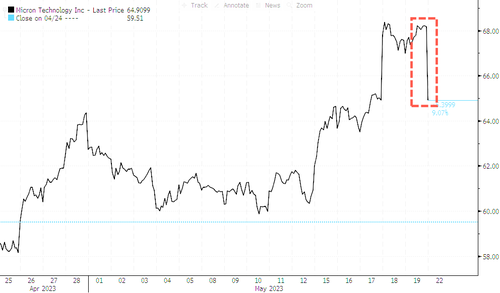
Hours after China banned Micron Technology's semiconductor products from critical infrastructure projects over a 'major national-security risk,' Seoul has stepped up and said South Korean companies Samsung and SK Hynix would fill the void as tensions between the US and China continue to escalate, reported Financial Times.
Even though the White House has urged South Korea to stop its chipmakers from supplying China if Beijing banned Micron from selling chips, policymakers in Seoul said Monday they would allow companies to make their own decision, independent of Washington's request:
"Regarding what the US tells us to do or not to do, it is actually up to our companies. Both Samsung and SK Hynix, with global operations, will make a judgment on this," South Korea's vice-minister of trade Jang Young-jin told reporters.
We detailed Beijing's ban on Micron Sunday night, as it's a retaliation strike over a sweeping US ban on Western companies from selling advanced chip-making technology to China. In other words, it's a tit-for-tat tech war.
However, Financial Times pointed out Washington might have leverage over Samsung and SK Hynix, which both are trying to expand business operations in the US and need "one-year waivers from the country to be extended so they can ship new equipment into their chip fabrication facilities in China .... these waivers must be renewed later this year, giving Washington potential leverage to use against the companies."
An industry exec told FT:
"There are not many Chinese companies that get chips only from Micron. Even if we increase our supply to Chinese customers, how can they examine all these deals individually and judge that the increased volume comes from us, replacing Micron's?"
FT noted:
"While South Korea is not a member of the G7, the group said it would work on creating a mechanism with a broad set of partners to deter and respond to Beijing's use of economic sanctions to further its geopolitical goals."
"Memory is a commodity, and supply chains will adjust in a couple [of] quarters," said SemiAnalysis' chief analyst Dylan Patel. He stated China could easily swap Micron's memory chips for Samsung or SK Hynix ones.
Patel believes long-term damage to Micron will be 'manageable.'
Meanwhile, shares of Micron slid nearly 5% early in the US cash session.
As previously mentioned, Gavekal Dragonomics estimates that 10% of Micron's revenue is derived from China. The tech war between the US and China is ongoing, with no signs of de-escalation.
Hours after China banned Micron Technology’s semiconductor products from critical infrastructure projects over a ‘major national-security risk,’ Seoul has stepped up and said South Korean companies Samsung and SK Hynix would fill the void as tensions between the US and China continue to escalate, reported Financial Times.
Even though the White House has urged South Korea to stop its chipmakers from supplying China if Beijing banned Micron from selling chips, policymakers in Seoul said Monday they would allow companies to make their own decision, independent of Washington’s request:
“Regarding what the US tells us to do or not to do, it is actually up to our companies. Both Samsung and SK Hynix, with global operations, will make a judgment on this,” South Korea’s vice-minister of trade Jang Young-jin told reporters.
We detailed Beijing’s ban on Micron Sunday night, as it’s a retaliation strike over a sweeping US ban on Western companies from selling advanced chip-making technology to China. In other words, it’s a tit-for-tat tech war.
However, Financial Times pointed out Washington might have leverage over Samsung and SK Hynix, which both are trying to expand business operations in the US and need “one-year waivers from the country to be extended so they can ship new equipment into their chip fabrication facilities in China …. these waivers must be renewed later this year, giving Washington potential leverage to use against the companies.”
An industry exec told FT:
“There are not many Chinese companies that get chips only from Micron. Even if we increase our supply to Chinese customers, how can they examine all these deals individually and judge that the increased volume comes from us, replacing Micron’s?”
FT noted:
“While South Korea is not a member of the G7, the group said it would work on creating a mechanism with a broad set of partners to deter and respond to Beijing’s use of economic sanctions to further its geopolitical goals.”
“Memory is a commodity, and supply chains will adjust in a couple [of] quarters,” said SemiAnalysis’ chief analyst Dylan Patel. He stated China could easily swap Micron’s memory chips for Samsung or SK Hynix ones.
Patel believes long-term damage to Micron will be ‘manageable.’
Meanwhile, shares of Micron slid nearly 5% early in the US cash session.
As previously mentioned, Gavekal Dragonomics estimates that 10% of Micron’s revenue is derived from China. The tech war between the US and China is ongoing, with no signs of de-escalation.
Loading…





